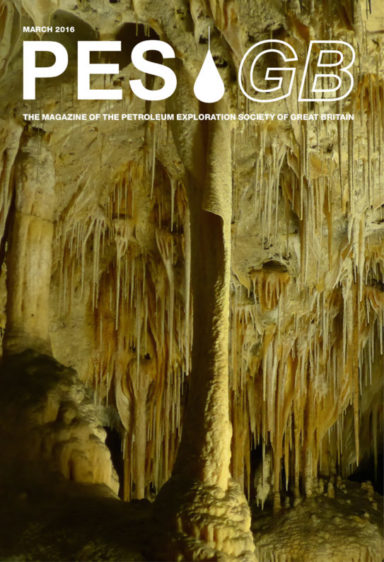PESGB March 2016
- New Frontiers on the UKCS, Colin Percival, PESGB President 2016
- International General Aberdeen Industry
- Pakistan’s Kohat Plateau: The Rise of a Formerly Frontier Province
Plus much more inside
New Frontiers on the UKCS
 By now most New Year Resolutions have been confined to the bin. Never again will I try and predict the oil price, which we all know is doomed to failure with far too many moving parts including politics, weather and technology to name but a few.
By now most New Year Resolutions have been confined to the bin. Never again will I try and predict the oil price, which we all know is doomed to failure with far too many moving parts including politics, weather and technology to name but a few.
The UK North Sea registered its first production increase for over 15 years in 2015 and there are a significant number of new field developments currently underway which will come on stream in the next few years to maintain or increase it further. However, the province was particularly hard hit in terms of exploration and appraisal activity with only 30 wells (17 wells and 13 sidetracks) spudded, a decrease of around 17% from 2014. In addition there were very few new field approvals and these were dominated by gas developments. One encouraging sign is that success rates and volumes seem to have improved, although this is from an extremely low base in 2014.
Those concerned about the UK tax payer funding poor exploration wells might be pleased by the low well count, but the main issue in the North Sea is finding commercially viable targets in a mature basin with high cost, high taxation and high regulation. Also investors are looking for some upside that won’t suddenly be grabbed by the Treasury. Good geoscience can only do so much, as can innovation and new technology. As the well count over recent years demonstrates, funds can often be put to better use elsewhere in the world where the prize is bigger, regulation is less onerous and the cost of doing business is often lower. As is often and rightly stated oil and gas left in the ground in the UK pays no tax, creates no jobs and does nothing for the UK’s balance of payments.
Having worked the UKCS for over 30 years I can’t remember a year when someone didn’t tell me that the UK was done and there was nothing left worth drilling. I never ceased to be impressed by the shear talent and ingenuity of the industry to continue to make the province thrive. What we need now are the right fiscal and regulatory environment to create the conditions that will enable this to happen when oil and gas prices eventually recover.
Over the last year or so there have been a considerable number of initiatives and conferences focussed on sharing knowledge to help improve the North Sea success rate. Of particular note are the CNS dry hole analysis by Christian Mathieu and the 21st Century Road Map. The CNS dry hole analysis report is available now, and the results of Palaeozoic project from the 21st Century Road Map will be made available to participating companies soon, in time for the UKCS 29th Licensing Round.
The UKCS 29th Licensing Round is expected to be announced soon, and will be the first under the new Oil and Gas Authority. The round will focus on the frontier areas of Rockall and the Mid North Sea High/Forth Approaches, both of which were covered by the new government funded 2D seismic. Data packages covering both areas will be made available at no cost, and for the first time frontier style licences should be available in the North Sea. The round will also include a small number of blocks in mature areas that have been nominated.
Recent UKCS licensing rounds have seen a fairly significant drop in the number of firm and contingent well commitments. Most commitment work programmes have been obtain 2D/3D, reprocessing and a drill or drop well. This reflects the maturity of much of the acreage on offer which has been licensed many times before. There has been a significant amount of acreage churn in recent years with awarded blocks being handed back with no new wells having been drilled. Targets are getting smaller and finding a commercially viable opportunity in the mature areas is a serious challenge. Although there is an argument for acquisition of new broadband seismic to illuminate additional targets, the commercial case for doing so needs to exist. Hopefully the oil price and the fiscal and regulatory regime will change and allow this to happen in time for the UKCS 30th Licensing Round in 2017 which will focus on mature areas.
The 29th Round in 2016 will be different in that the acreage available is largely frontier which has not been licensed recently and contains few existing wells. With exploration funds in very short supply it will certainly be interesting to see what the industry makes of it!


